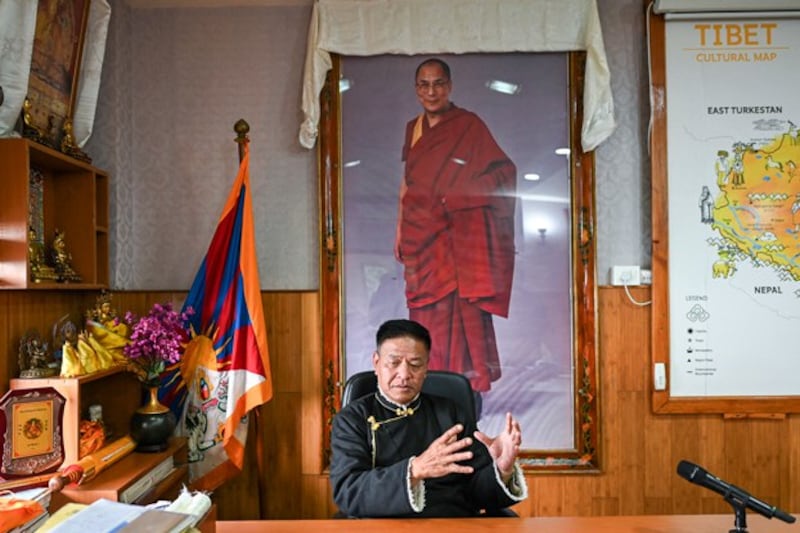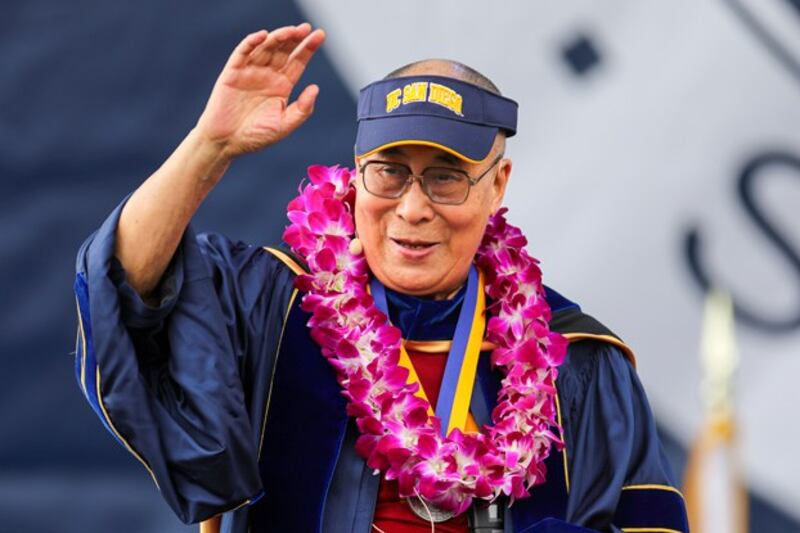The Dalai Lama is scheduled to visit the United States for medical treatment for his knees in the coming weeks, according to his office, in what would be his first visit to the country since 2017.
Though the dates for which have not yet been announced, his trip is expected to take place this summer. It will be the Dalai Lama’s first overseas trip since November 2018 and first overseas trip since the coronavirus pandemic.
The statement issued by his office in Dharamsala, in northern India, where the 88-year-old Tibetan Buddhist spiritual leader lives in exile, said there will be no engagements scheduled from June 20 onwards.
The Dalai Lama enjoys strong support in the United States, where prominent lawmakers have spoken out about human rights issues in Tibet, through China considers him a separatist and has criticized those who meet with him.
Neither the Dalai Lama’s private office nor his representative in the Washington-based Office of Tibet commented on Radio Free Asia’s inquiries about the exact dates of his scheduled U.S. travel, citing security reasons.

T he U.S. magazine The Atlantic said the exact timing of the Dalai Lama's visit "is not yet decided," citing sources involved in planning the trip, but that it will follow a visit later this month to Dharamsala by a bipartisan congressional delegation led by Rep. Nancy Pelosi, a California Democrat and former speaker of the House. She is a staunch supporter of human rights in Tibet.
Her spokesperson declined to comment on the news, saying, “We do not comment on Speaker Pelosi’s upcoming or potential foreign travel” due to security concerns.
The Atlantic also said the Dalai Lama, who has bad knees, has decided to travel to the U.S. "this summer to investigate the possibility of replacement" for his knees.
During the Dalai Lama’s last U.S. trip in June 2017, he gave the keynote address to 25,000 graduates and their families at the University of California, San Diego. Additionally, he underwent his annual medical check-up in Rochester, Minnesota, as part of his routine health checks. His 2017 visit also included a stop in Massachusetts.
The Dalai Lama's most recent foreign trip outside of India was to Japan in November 2018, where he conducted a series of teachings and public events in Yokohama, Tokyo, Chiba and Fukuoka.
Although he hasn't traveled abroad since 2018, he has continued to travel every year to Bodh Gaya, the holiest pilgrimage site for Buddhists, located in northeast India to conduct teachings, except during the COVID-19 lockdown in India.
Foreign visits
For years, the Dalai Lama has shared Buddhist teachings globally, while advocating for increased autonomy for Tibet and engaging with global leaders to urge China to implement these changes.
Despite the pain of being in exile, he acknowledges its benefits, facilitating his travel, interactions with diverse individuals, and the dissemination of Buddhist wisdom as a Nobel Peace Prize laureate.
Beijing has consistently criticized and opposed any foreign trips by the Dalai Lama and regards them as "a severe insult" to the feelings of the Chinese people.
“The Chinese consider such visits … a deviation from their commitment to recognizing the government of the People's Republic of China as the sole legal government representing the whole of China,” Zhang Yijiong, a senior Communist Party leader, said in October 2017.

The Dalai Lama and the Central Tibetan Administration — the Tibetan government-in-exile — has adopted a Middle Way approach to the question of Tibet’s status under Beijing’s rule, by which accepts Tibet as a part of China but urges greater cultural and religious freedoms, including strengthened language rights guaranteed for ethnic minorities under the provisions of China’s own constitution.
Nine rounds of talks on greater autonomy in Tibet and Tibetan populated areas of China were held between envoys of the Dalai Lama and high-level Chinese officials beginning in 2002, but stalled in 2010 and were never resumed.
Resolve Tibet Act
The Dalai Lama's visit comes amid the much-awaited passage of a U.S. bill urging the Chinese government to engage in dialogue, without any preconditions, with the Dalai Lama or his representatives or democratically elected Tibetan leaders to resolve the China-Tibet dispute.
The bipartisan Promoting a Resolution to the Tibet-China Dispute Act, also known as the Resolve Tibet Act, calls on China to “cease its propagation of disinformation about the history of Tibet, the Tibetan people, and Tibetan institutions, including that of the Dalai Lama.”
The Senate unanimously approved a revised version of the bill and is due for another vote by the House. If approved, it will go to U.S. President Joe Biden, who is likely to sign it into law.
In 2020, while serving as the Democratic party presidential nominee, Biden pledged to urge China to engage in discussions with Tibetans aimed at achieving "meaningful autonomy."
He also said at the time that if elected president, he would meet with the Dalai Lama, although he has yet to do this since taking office in 2021.
In December 2021, the Biden administration appointed Uzra Zeya as under secretary for civilian security, democracy, and human rights to serve concurrently as the U.S. special coordinator for Tibetan issues.
Additional reporting by Tenzin Dhonyoe and Dorjee Damdul for RFA Tibetan. Edited by Tenzin Pema for RFA Tibetan and by Roseanne Gerin and Malcolm Foster.
